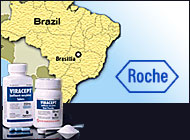Roche agrees to lower price of Aids drug in Brazil

The Swiss pharmaceutical giant, Roche, has agreed to cut the price of its Aids drug, Nelfinavir, by 40 per cent, ending fears of a patent battle with the Brazilian government.
The announcement comes a week after Brazil’s health minister, Jose Serra, said he would employ a clause in the country’s 1997 intellectual property law that allows patents to be broken in cases of national emergency or when companies employ abusive pricing policies.
At a press conference in Rio de Janeiro, Serra said the government would save $35.4 million (SFr59.2 million) a year as a result of Roche’s decision. Nelfinavir is used to treat 25,000 people with Aids under a free distribution programme.
“With these extra resources we can now strengthen our People’s Pharmacy programme,” he said.
Six months of negotiations between the two sides appeared to have reached a dead end last week when Serra announced that Brazil would begin local production of Nelfinavir at the beginning of next year, unless Roche lowered the price by 40 per cent.
It was the first time Brazil had said it would break the patent on an anti-Aids medication, despite previous threats to do so. Brazil has the highest number of Aids victims in Latin America and distributes a “cocktail” of anti-Aids drugs free to sufferers. Last year, some 90,000 people received the drugs, which would have cost them up to $15,000 each.
Expensive treatment
Brazil says its drug handout programme has driven down the number of Aids deaths each year from 11,024 to 4,136 in just four years. Doctors have hailed the programme as a model for other developing countries, where few can afford expensive treatment.
With new anti-AIDS drugs coming to market, the government said it might be necessary to employ compulsory licensing if drug companies did not move to lower costs.
Brazil spends about $88 million, or 28 percent of its $303 million anti-Aids budget, on Nelfinavir every year. About a quarter of Brazilian Aids patients use the drug.
Last week, scientists at the government’s Farmanguinhos lab said they had successfully copied Nelfinavir and were subjecting it to equivalency tests expected to last three months.
According to the Health Ministry, the government would have realised a 40 percent saving by making the drug at Farmanguinhos.
The president of Roche Brazil, Ernest Egli stated: “We are pleased that after lengthy negotiations we have reached this agreement with the Minister of Health which is acceptable for both parties.
“In achieving this outcome we can continue to make a very special effort to collaborate with the exemplary AIDS programme of the Brazilian Government.”
In addition, Roche said it would be starting local production of the drug in Brazil early next year.
swissinfo with agencies

In compliance with the JTI standards
More: SWI swissinfo.ch certified by the Journalism Trust Initiative










You can find an overview of ongoing debates with our journalists here . Please join us!
If you want to start a conversation about a topic raised in this article or want to report factual errors, email us at english@swissinfo.ch.